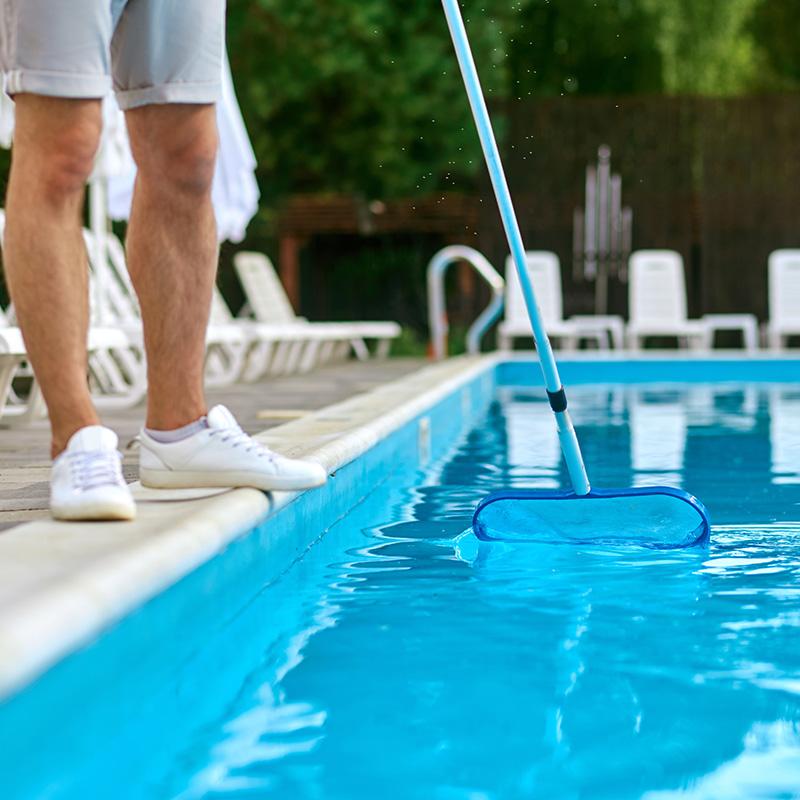APPI Pool & Spa
Pool Care Tips
Many people who consider owning a pool recognize its benefits as a source of fun, relaxation, and much more. However, pools also require a level of commitment and time. In order to fully enjoy your pool, you must take steps to keep it free from bacteria and other debris. It is also important to ensure that all who swim in the pool observe key safety rules. Pool Care is an important aspect of owning and enjoying a pool.
If you are looking for assistance with your pool/spa, please get in touch with us by calling us at (831) 476-6363 or via email at service@appipool.com.
At the beginning of the summer, a pool must be prepared for use; this involves having your water analyzed and making sure that it is chemically balanced. The pool must also be checked to make sure that it is clean and working properly. Evaluating things like pH, Alkalinity, Calcium, and other factors keeps the water safe and the pool in good shape. During the summer, the pool must also be regularly checked to make sure all of these things are still operating properly. At the end of the season, the pool will need to be closed for the winter. Once again, there are specific Pool Care guidelines that should be followed to make certain that your pool is safe and in good condition.
Advice on Pool Care can be easily acquired if you have specific questions or concerns. Not only is the internet a quick source of information, but employees at pool stores will also be very knowledgeable about water levels, common pool problems, etc. There are also many books available on the subject if your questions need such attention.
Proper pool water care is crucial if you own (or take care of) a pool. It ensures that the water is safe and that the pool itself stays in good condition. When you are ready to begin using your pool for the Spring follow these guidelines for getting your pool ready to use.
First, test the pool water regularly and add whatever chemicals will balance the water. When water is added from a hose or as rain, the chemicals in the water may require adjustment. Even without water addition, the water should still be checked to make sure that it has not become unbalanced. You may also need to add water to the pool to keep it at its proper levels.
Second, clean the pool of dirt and other contaminants. Pollution such as dirt, pollen, bacteria, leaves, and dust are brought into the pool by the wind. Pool users bring sunscreen, sweat, urine, bacteria and viruses into the water. The pump removes most of floating particles, so it should run for six to eight hours a day. In fact, most pumps have a timer that controls the pump’s cycle, ensuring that all of the water is filtered. Even still, the contaminants on the bottom of the pool and the walls are not filtered out.
In order to properly clean the rest of the pool that auto cleaners may not process, brush the walls and floor of the pool once a week with a pool type nylon brush. After the dirt and other particles from the walls and floor settle, vacuum the bottom of the pool.
Periodically, filter cleaning is needed. The cleaner the filter the more energy efficient your system will be and the easier it will be to care for the pool. Whether you have sand, DE, or cartridge – keep the filter clean – generally a 5 psi rise above the clean filter pressure is the recommended time to clean the unit.
These steps in Pool Care will allow you to keep a clean, chemically balanced pool that you can maintain and enjoy throughout the season.
As Fall approaches it usually means time to close your pool for the winter. While some people may think that “closing” the pool means they have no more responsibilities in Pool Care until the next season, this is incorrect. In order to make sure that the pool is in good working order next Spring, you must follow these steps in Pool Care while closing your pool.
- Take a sample of the water to your pool dealer for analysis
- Make the proper chemical adjustments that he recommends. Your chlorine level should be at 2 – 3 ppm, pH 7.4 – 7.6, alkalinity 80 – 100 ppm, hardness 200 – 300 ppm before you do anything else to close your pool.
- Put a product in your pool that will lengthen the time that the chlorine remains active. These are available at all pool dealers. After the chemicals have had time to combine, adjust your time for operation on the pump to a reasonable amount of time based upon water temperature and environmental load.
- Make sure that the pool and all of its parts are completely clean, even off season it’s important to keep the pool clean. If you winter cover your pool a solid cover helps keep out the Fall and Winter debris. Remember keeping this cover maintained becomes the chore for the off season
- Make sure your auto cleaner is in good condition and that its program for operation is reasonable for off season
- Check in on your pool every few weeks to be certain that it is well maintained
- Off season is a great time to algae treat if you’ve had any troubles and also for stain removal – ask us about these important often overlooked off season tasks
By following these simple steps your pool will be really ready for the next season!
Most people get a pool because they want to be able to enjoy it; this seems obvious. However, many individuals forget about Pool Care and specifically many safety precautions when taking pleasure in their pool. Your family and friends will have the most fun when your pool is properly maintained and everyone observes safety guidelines.
- Make sure that young children who cannot swim are supervised.
- Do not bring glass into the pool area. Broken glass is a huge hazard for people probably wearing only bathing suits.
- Mark pool depths; do not dive into shallow water!
- Keep a stocked first-aid kit in the pool area, and post emergency numbers.
- Learn CPR. You never know when you might need to know how to save someone’s life.
- If you do not already have one, put up a fence. This keeps children, animals, and even adults who are not supposed to be in the pool area out unless supervised.
- Keep pool chemicals stored in a cool, arid location where children cannot get to them.
- Do not let the pool chemicals touch your skin or clothes, or get into your eyes or hair. If they do, follow the instructions on the labels, or call Poison Control Center.
- Wear goggles so that the chemicals do not get into your eyes.
- Wash your hands after using chemicals.
- Never let children put chemicals into the pool. While it may seem like a benign and even fun act, it can have dangerous repercussions.
- Do not mix different chemicals. Even different brands of the same chemical may not be safe. Check with your chemical supplier before combining any chemicals.
Remember that pools are most fun and relaxing when proper pool care is employed. Taking good care of your pool and those around it will ensure that you can enjoy your pool for years to come!

